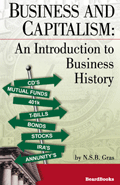|
|
|
|
||||||

|
Business and Capitalism: An Introduction to Business
History Scholars and others interested in the rise and role of business history will find this book informative and appealing. Publisher Comments
This is a reprint of the 1939 classic written by the foremost authority of business history for the first half of the twentieth century. It is often cited and is on many required reading lists for business history courses. Subjects covered include the author's classifications of petty capitalism, mercantile capitalism, industrial capitalism, financial capitalism, and national capitalism. One dictum that emerges: "One group of capitalists may win over another and the victory may be progressive or retrogressive, but some form of capitalism will remain triumphant." Review by Henry Berry Gras's book is as relevant and enlightening to the fundamentals, practices and trends of today's business world as it was when it was first published in 1939. This was a time when the value and resiliency of capitalism were being challenged from without by communism and other ideologies and also from within by the depression. But such is the breadth and soundness of Gras's history, that he is able to put these threats into perspective even in his own day. Obviously, capitalism survived; whereas the threats to it of Gras's day, as he saw them did not much affect the basics of business and capitalism. From Gras's point of view, business and capitalism cannot be put aside by revolution or political change or superseded by utopian societies because they are inextricably rooted in history, human nature and society, particularly social needs and aspirations. Rudiments of business can be found in primitive and ancient societies. Gras focuses of these much as anthropologists focus on the religious rituals and family structures of early societies. He sees in some of these a cultural nomadic economy, and in others, a pastoral nomadic economy. Herds of animals, for example, were the capital in the cultural nomadic economy; in the pastoral nomadic economy, the capital was field of crops. The "business man" is differentiated from the primitive shepherd in that the shepherd raises his sheep mainly to feed himself and a small number of others, only occasionally trading them outside this small circle. By contrast, the business man is not directly involved in production; he administers labor and resources to produce something that can be exchanged, i.e., sold. Gras stresses that "business is administration that looks toward exchange." "Petty capitalism," is the first stage of the intertwined business and capitalism that takes up most of Gras's lengthy history and analysis, formed in early towns on all continents. The names of many of these towns are well known: Babylon, Athens, Rome, London, Paris, Amsterdam. That they were centers of petty capitalism of their bourgeoisie is a principal reason they had significant roles in history. Peddlers, shopkeepers, and tradesmen represented this petty capitalism. This first stage of capitalist business became more highly organized in the course of history, and more multifaceted. The petty capitalism was succeeded by mercantile capitalism, represented by merchants who entered into partnerships with other merchants, issued stock in their businesses and developed sophisticated bookkeeping practices. Later came industrial capitalism with its large factories, complex production processes, and widespread, and in some cases, international markets. Industrial capitalism spawned financial capitalism involving diversified practices and services of stock markets and banks to meet the big and sometimes unexpected financial requirements to sustain it and allow it to grow. Today's diversified, vibrant, and global US economy can be seen as the high point of Gras's industrial capitalism mixed with his financial capitalism. He ends his economic history with a chapter on the national capitalism practiced by Nazism and Fascism which, at the time, challenged the centuries of business progress based on private capitalism. But these challenges were turned back in World War II. Economic historian N.S.B Gras was a professor of business history at Harvard's Graduate School of Business. In 1926, he founded the Business History Society along with its "Journal of Business History." N.S.B. Gras, 1884-1956, was an economic historian. He was the first to thoroughly examine the field of business history and was the foremost authority in the field for the first half of the twentieth century. He was a Professor of Business History at the Graduate School of Business, Harvard University. In 1926, he founded the Business History Society and its Journal of Business History.
|
||||||||||||||||||||||||||||||||||||||||||||||||||||||||||||||||||||||||||||||||||||||||||||||||||||||||||||||||||||||||||||||||||||||||||||||||||||||||||||||||||||||||||||||||||||||||||||||||||||||||||||||||||||||||||||||||||||
|
|
|
home
| about
us | contact
us | related
sites |